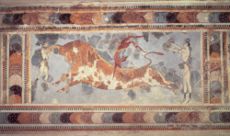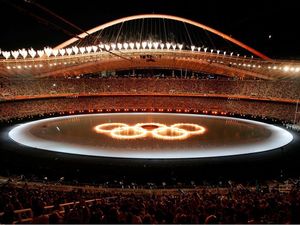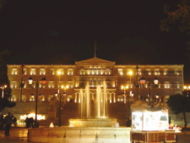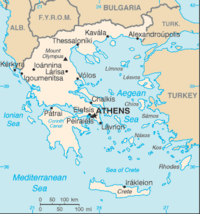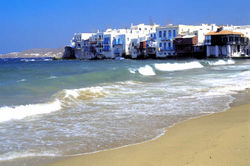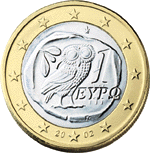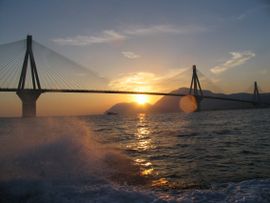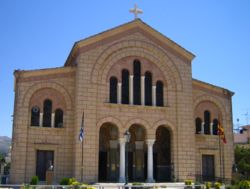Greece
2007 Schools Wikipedia Selection. Related subjects: Countries; European Countries
| Ελληνική Δημοκρατία Ellinikí Dimokratía Hellenic Republic |
|||||
|
|||||
| Motto: Ελευθερία ή Θάνατος ( Transliteration: Eleftheria i thanatos) ( Translation: "Freedom or Death") |
|||||
| Anthem: Ύμνος εις την Ελευθερίαν (" Hymn to Freedom") |
|||||
| Capital (and largest city) |
Athens |
||||
| Official languages | Greek | ||||
|---|---|---|---|---|---|
| Government | Parliamentary Republic | ||||
| - President | Karolos Papoulias | ||||
| - Prime Minister | Kostas Karamanlis | ||||
| Independence | from Ottoman Empire | ||||
| - Last Independent Greek State | 1461 Empire of Trebizond | ||||
| - Declared | 25 March 1821 | ||||
| - Recognized | 1829 | ||||
| Accession to EU | January 1, 1981 | ||||
| Area | |||||
| - Total | 131,990 km² ( 96th) 50,944 sq mi |
||||
| - Water (%) | 0.8669 | ||||
| Population | |||||
| - 2005 estimate | 11,244,118 ( 74th) | ||||
| - 2001 census | 10,964,020 | ||||
| - Density | 84/km² ( 108th) 218/sq mi |
||||
| GDP ( PPP) | 2006 estimate | ||||
| - Total | $261.018 billion ( 37th) | ||||
| - Per capita | $23,518 ( 30th) | ||||
| HDI (2004) | 0.921 (high) ( 24th) | ||||
| Currency | Euro ( €)2 ( EUR) |
||||
| Time zone | EET ( UTC+2) | ||||
| - Summer ( DST) | EEST ( UTC+3) | ||||
| Internet TLD | .gr 3 | ||||
| Calling code | +30 | ||||
| 1 Monarchy rejected by referendum on December 8th, 1974. 2 Prior to 2001: Greek Drachma. 3 The .eu domain is also used, as it is shared with other European Union member states. |
|||||
Greece ( Greek: Ελλάδα [eˈlaða] or Ελλάς [eˈlas]), officially the Hellenic Republic (Ελληνική Δημοκρατία [eliniˈci ðimokraˈtia]), is a country in south-eastern Europe, situated on the southern end of the Balkan peninsula. It is bordered by Bulgaria, the Former Yugoslav Republic of Macedonia and Albania to the north and by Turkey to the east. The Aegean Sea lies to the east of mainland Greece while the Ionian Sea lies to the west. Both parts of the eastern Mediterranean basin, feature a vast number of islands.
Greece lies at the juncture of Europe, Asia, and Africa. It is heir to the heritages of classical Greece, the Byzantine Empire, and nearly four centuries of Ottoman rule. Regarded as the cradle of western civilization and being the birthplace of democracy, Western philosophy, the Olympic Games, western literature, political science, major scientific principles as well as drama including both tragedy and comedy, Greece has a particularly long and eventful history and a cultural heritage considerably influential in Europe, Northern Africa and the Middle East. Today, Greece is a developed country, member of the European Union since 1981 and a member of the Economic and Monetary Union of the European Union since 2001. Athens, Thessaloniki, Piraeus and Patra are the country's major cities.
History

The shores of Greece's Aegean Sea saw the emergence of the first advanced civilizations in Europe whose impact is inseparable from today's western institutions. Home to the Classical civilization, Greece became a Roman province and in the process transformed Rome itself. Following the emergence of the Greek-speaking Byzantine Empire and 400 years of Ottoman control the modern Greek state evolved after 1821-1830 as an independent Kingdom. It increased its territorial area up until 1922, which saw the collapse of the Greek presence in Asia Minor.
Greece was growing economically, whilst becoming politically more liberal. In 1877, Prime Minister Charilaos Trikoupis curbed the power of the monarchy to interfere in the Assembly. This period was punctuated by the undertaking of one of the largest construction initiatives in Europe: the creation of the Corinth Canal (1881 - 1893), and in 1896 the Olympic Games were revived in Athens, judged a success. As a result of the Balkan Wars of 1912-13, Crete, Chios, Samos, most of Epirus and southern Macedonia, including Thessaloniki, were incorporated into Greece. King George was assassinated in Thessaloniki in 1913 and succeeded by his Germanophile son, King Constantine I, whose struggle with Prime Minister Eleftherios Venizelos resulted in Greece's joining of the Entente against Germany and Austria, and the abdication of King Constantine in favour of his son, Alexander.
A small part of Asia Minor, which still retained a majority Greek population and was centred around the city of Smyrna (known today as Izmir), was awarded to Greece by the Great Powers for having sided with the entente powers in World War I against the Ottoman Empire. Very soon, however, Turkish nationalists, led by Mustafa Kemal Atatürk, denounced the Sultan's government in Istanbul and formed a new one in Ankara, eventually defeating the Greeks ( Greco-Turkish War (1919-1922)) when the Great Powers stopped supplying the Greek armies.
Following the regaining of control of Asia Minor and the destruction of Smyrna, a new government was established. Soon afterwards, the Treaty of Lausanne was signed, fixing the borders to this date. A population exchange was included in the agreement and immediately afterward, around five hundred thousand Muslims then living in mainland Greek territory left for Turkey in exchange for more than 1.22 million Greek residents of Asia Minor (excluding Constantinople, Imvros and Tenedos).
In 1936, General Ioannis Metaxas established an authoritarian conservative dictatorship in Greece, known as the 4th of August Regime, and shortly before the outbreak of World War II a disputed referendum was held, resulting in a 'yes' to restore the monarchy under King George II.
On October 28, 1940, the Italian dictator Mussolini demanded that Greece allow Axis troops to enter the country and to surrender its arms; the Greek government gave what became known as the simple negative response of “No” (see Okhi Day) — thereby immediately siding with the Allies (see Military history of Greece during World War II). Italian troops poured over from Albania but were foiled by the Greeks at the Albanian front, giving the Allies their first victory against fascism (see Greco-Italian War). Since Hitler and his generals needed to secure their strategic southern flank, German forces, whose ranks included troops from Bulgaria and Italy, successfully invaded, and the occupation of Greece by Nazi Germany began in April–May, 1941 (see Battle of Greece). Greek partisan resistance to the occupation was fierce, often with bitter retaliation from the occupiers. Greek Resistance however, such as that waged in Crete, is believed to have forced a delay in German plans to initiate invasion against the Soviet Union, thereby extending the campaign into the punishing Russian winter, while the extremely heavy losses of German paratroop forces foiled a planned German campaign in the Middle East against British-held Iraq and its oil fields. Germany retained its grip on the country until 1944 when German troops withdrew. The Jewish community of Thessaloniki suffered the heaviest toll by far and the Greek economy languished.
After liberation from Nazi Germany, Greece experienced an equally bitter Greek Civil War between the communist-led Democratic Army and Hellenic Army lasting until 1949, when the communists were defeated in the battle of Grammos-Vitsi. During the 1950s and 1960s, Greece experienced a gradual and consistent economic growth, aided by significant grants and loans by the United States through the Marshall Plan. However, starting in 1965, a period of turbulence and the subsequent political uncertainty led to a coup d’etat against the elected government and King Constantine II that took place in the dawn of April 21, 1967, and the establishment of a US-supported military junta ( Regime of the Colonels). In the ensuing years, a number of sympathisers of the left, as well as a number of politicians and communists, were arrested and brutally tortured by the regime. Many politicians evaded capture and found political refuge in other European countries such as France and Sweden, but the then-head of state, King Constantine, officially acknowledged the new regime, which was also then duly recognized by the international community, and diplomatic relations continued; he attempted a counter coup in December, 1967 which was to fail, and he went to Rome in exile. It collapsed in July 1974.
Ex Premier Constantine Karamanlis was invited back on July 23, 1974 from Paris, where he had found political refuge. Marking the beginning of the Metapolitefsi era of Greek history, the plane carrying Constantine Karamanlis landed in Athens amidst massive celebrations and enormous crowds in Syntagma Square; Karamanlis was immediately appointed interim prime minister under President Gizikis, and founded the conservative New Democracy party, going on to win the ensuing elections by a large margin. Democracy was finally restored and a democratic republican constitution came into force in 1975. The monarchy was abolished by a referendum held that same year, denying King Constantine II and his family any access to the country until 2004. Meanwhile, another prominent figure of the past, politician Andreas Papandreou, had also returned from the United States, and founded the Panhellenic Socialist Party, or PASOK.
Karamanlis won the 1977 parliamentary elections, but resigned in 1980 giving way to George Rallis; Papandreou, however, won the elections held on October 18, 1981 by a landslide and formed the first socialist government in Greece's history. Papandreou dominated the Greek political stage for almost 15 years until his death in June 23, 1996, by which time Kostas Simitis, another prominent political figure of PASOK, had already succeeded him as Prime Minister. Simitis remained in office until March 7, 2004, when Kostas Karamanlis of the conservative New Democracy party won elections.
Greece became the tenth member of the European Union on January 1, 1981 and ever since the nation has experienced remarkable and sustained economic growth. Widespread investments in industrial enterprises and heavy infrastructure, as well as funds from the European Union and growing revenues from tourism, shipping and a fast growing service sector have raised the country's standard of living to unprecedented levels. The country adopted the Euro in 2001 and successfully organised the 2004 Olympic Games in Athens.
Politics
The 1975 Constitution, describes Greece as a "presidential parliamentary republic”, grants extensive specific guarantees of civil liberties and vests the powers of the head of state in a President elected by parliament for a 5 year term. The Greek governmental structure is similar to that found in many Western democracies, and has been described as a compromise between the French and German models. The Prime Minister and cabinet play the central role in the political process, while the President performs some executive and legislative functions in addition to ceremonial duties.
The Prime Minister of Greece is the head of government, and Executive power is exercised by that government. Legislative power is vested in both the government and the Hellenic Parliament. The Judiciary is independent of the executive and the legislature and comprises three Supreme Courts: the Court of Cassation (Άρειος Πάγος), the Council of State (Συμβούλιο της Επικρατείας) and the Court of Auditors (Ελεγκτικό Συνέδριο). The Judiciary system is also comprised of civil courts, which judge civil and penal cases and administrative courts, which judge administrative cases, namely disputes between the citizens and the State.
Greece elects a legislature by universal suffrage of all citizens over the age of 18. The Hellenic Parliament (Vouli ton Ellinon) has 300 members, elected for a four-year term. Since the restoration of democracy the party system is dominated by the liberal-conservative New Democracy (Νέα Δημοκρατία - Nea Dimokratia) and the socialist PASOK, or Panhellenic Socialist Movement (Πανελλήνιο Σοσιαλιστικό Κίνημα - Panellinio Sosialistiko Kinima). Non-negligible parties include the Communist Party of Greece and the Coalition of the Radical Left.
On March 7, 2004, Kostas Karamanlis, president of the New Democracy party and nephew of the late Constantine Karamanlis, was elected as the new Prime Minister of Greece, thus marking his party's first electoral victory in nearly 11 years. Karamanlis took over Government from Kostas Simitis of PASOK, who had been in office since January 1996.
Administrative divisions
Peripheries: Greece consists of 13 administrative regions known as peripheries, which subdivide further into the 54 prefectures (nomoi, singular — nomos). For more detailed maps of the peripheries and/or prefectures, see the Peripheries of Greece or Prefectures of Greece articles.
Autonomous region:Greece has one autonomous region, Mount Athos (Agio Oros — Holy Mountain) in Macedonia.
Military
See Military of Greece
Geography
Greece consists of a mountainous and craggy mainland jutting out into the sea at the southern end of the Balkans. The Peloponnesus peninsula (separated from the mainland by the canal of the Isthmus of Corinth); and numerous islands (around 3,000), including Crete, Euboea, Lesbos, Chios, the Dodecanese and the Cycladic groups of the Aegean Sea as well as the Ionian Sea islands. Greece has the 7th or 8th longest coastline in the world with more than 15,000 kilometres (9,300 mi); its land boundary is 1,160 kilometres (721 mi).
Four fifths of Greece consist of mountains or hills, making the country one of the most mountainous in Europe. Western Greece contains a number of lakes and wetlands and it is dominated by the Pindus mountain range. Pindus has a maximum elevation of 2,636 metres (8,648 ft) and it is essentially a prolongation of the Dinaric Alps.
The range continues through the western Peloponnese, crosses the islands of Kythera and Antikythera and find its way into southwestern Aegean, in the island of Crete where it eventually ends. (the islands of the Aegean are peaks of underwater mountains that once consisted an extension of the mainland). Pindus is characterized by its high, steep peaks, often dissected by numerous canyons and a variety of other karstic landscapes. Most notably, the impressive Meteora formation consisting of high, steep boulders provides a breathtaking experience for the hundreds of thousands of tourists who visit the area each year. Special lifts transfer visitors to the scenic monasteries that lie on top of those rocks. Meteora are situated in the Trikala prefecture. The Vikos-Aoos Gorge is yet another spectacular formation. The Vicos-Aoos Gorge is a popular hotspot for those in fond of extreme sports.
The mythical Mount Olympus is the highest mountain in the country, located in the southwestern Pieria prefecture, near Thessaloniki. Mytikas in Olympus range has a height of 2,918 metres (9,570 ft) at its highest peak. Once considered the throne of the Gods, it is today extremely popular among hikers and climbers who deem its height as a challenge. Moreover, northeastern Greece features yet another high altitude mountain range, the Rhodope range, spreading across the periphery of East Macedonia and Thrace; this area is covered with vast, thick, ancient forests. The famous Dadia forest is in the prefecture of Evros, in the far northeast of the country.
Expansive plains are primarily located in the prefectures of Thessaly, Central Macedonia and Thrace. They constitute key economic regions as they are among the few arable places in the country. Volos and Larissa are the two largest cities of Thessaly.
Rare marine species such as the Pinniped Seals and the Loggerhead Sea Turtle live in the seas surrounding mainland Greece, while its dense forests are home to the endangered brown bear, the lynx, the Roe Deer and the Wild Goat.
Climate of Greece
The climate of Greece can be categorised into three types that influence well defined regions of its territory. The Pindus mountain range strongly affects the climate of the country. The three distinct types are the Mediterranean, the Alpine and the Temperate types. The first one features mild, wet winters and hot, dry summers. The Cyclades, the Dodecanese, Crete, Eastern Peloponessus and parts of the Sterea Ellada region are mostly affected by this particular type. Temperatures rarely reach extreme values although snowfalls do occur occasionally even in the Cyclades or Crete during the winter months. The Alpine type is dominant mainly in Western Greece (Epirus, Central Greece, Thessaly, Western Macedonia as well as in the western and central parts of Peloponessus, including the prefectures of Achaea, Arcadia and parts of Laconia, where the Pindus range passes by). Finally the Temperate type affects Central and Eastern Macedonia as well as Thrace, mainly affecting the cities of Komotini, Xanthi and the towns of northern Evros; it features cold, damp winters (with 52 inches of rain in Corfu and 25 inches in Crete)and hot, dry summers. Athens is located in a transitional area featuring both the Mediterranean and the temperate types.It averages about 16 inches of rain annually. The city's northern suburbs are dominated by the temperate type while the downtown area and the southern suburbs enjoy a typical Mediterranean type.
Economy
Greece has a capitalist mixed economy. The nation's main economic activity is primarily based on the tourism, shipping, banking & finance and construction sectors while the country serves as the regional business hub for many of the world's largest multinational companies. Greece enjoys a high standard of living, ranking 24th on the 2006 Human Development Index and 22nd on The Economist's 2005 world-wide quality-of-life index and it has an average per capita income that has been estimated at $23,518 for the year 2006. The implementation of a number of structural and fiscal reforms, combined with considerable European Union funding over the last 25 years and increasing private consumption have contributed to the fact that the Greek GDP annual growth consistently out-performs the European average.
Main exports from Greece include:
Services, make up the largest, most vital and fastest-growing sector of the Greek economy, accounting for about 70% of GDP in 2002 followed by manufacturing and agriculture. The thriving tourism industry is a major source of foreign exchange earnings and revenue accounting for 14.3% of Greece’s total GDP and employing (directly or indirectly) 659,719 people (or 16.5% of total employment). Fifteenth country in the world concerning the total number of tourists, Greece welcomed over 16.5 million visitors in 2004 alone, and almost 18 million in 2005, after the 2004 Summer Olympic Games. With earnings of €12 bn in foreign exchange and a leading fleet on a global basis, the shipping industry is arguably considered as one of Greece's most important industries. The Greek banking & Finance sector is also an important source of revenue and employment and Greek banks have invested heavily in the Balkan region. The manufacturing sector accounts for about 13% of GDP with the food industry leading in growth, profit and export potential. High-technology equipment production, especially for telecommunications, is also a fast-growing sector. Other important areas include textiles, building materials, machinery, transport equipment, and electrical appliances. Construction (10%GDP) and agriculture (7%) are yet two other significant sectors of the Greek economic activity.
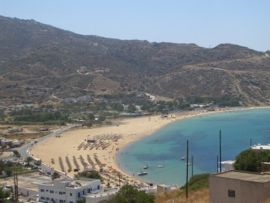
After the end of the Greek Civil War in 1949 and for more than two decades Greece achieved the second highest economic growth rate in the world after Japan, resulting in a dramatic improvement of living standards (the " Greek economic miracle"). Since Greece became a full member of the European Union, on January 1, 1981, it has benefited from cohesion funds, along with Portugal, Spain and Ireland that have contributed considerably to the nation's remarkable economic development since the 1980s. In 1989 Greece belonged to a group of 22 " advanced economies".
During the second quarter of 2006, Greece experienced a strong 4.1% growth rate, while in the same period of the previous year, the growth rate was 3.4%. This is among the highest rates in the EU and the Eurozone, where the average growth rates for these periods were estimated to stand as 1.6% and 1.3% respectively. Current challenges include the further reduction of unemployment which currently stands at 8.8%, the reform of the social security system, the further privatization of the public sector, the overhauling of the tax system and the further reduction of certain bureaucratic inefficiencies. Reduction of the fiscal deficit to the Eurozone target of 3% of GDP had also become a key issue. Under a negotiated agreement, the EU has given Greece a two year deadline (budgets of 2005 and 2006) in order to bring the deficit in line with the criteria of the European stability pact, namely below 3%. In 2005, the deficit had declined significantly and stood at 4.5% of GDP, in line with Greece's commitments to the European Union. As of mid 2006, the achievement of that goal is deemed as certain within the time constraints set by Eurostat.
Science and technology
Because of its strategic location, qualified workforce and political and economic stability, many multinational companies, such as Ericsson, Siemens AG, SAP, Motorola, have their regional R&D Headquarters in Greece.
The General Secretariat for Research and Technology of the Hellenic Ministry of Development is responsible for designing, implementing and supervising national research and technological policy.
In 2003, public spending on R&D was 456,37 million Euros (12,6% increase from 2002). Total R&D spending (both public and private), as a percentage of GDP has increased considerably since the beginning of the past decade, from 0,38% in 1989, to 0,65% in 2001.
R&D spending in Greece remains lower than the EU average of 1,93% but according to Research DC, based on OECD and Eurostat data, between 1990 and 1998, total R&D expenditure in Greece enjoyed the third highest increase in Europe, after Finland and Ireland.
In 2001, there were 55,626 researchers (from 30,500 in 1993)in such fields as telecommunications, microelectronics, multimedia, computer science, computer networks and software engineering, attracting the interest of many multinational companies and producing an increasing number of high quality publications. Of that number approximately, 33,507 were employed in Higher Education Foundations, 13,100 by private companies, 8,800 in State-owned Research Centres and approximately 200 in non-profit private research centres.
Greece's technology parks with incubator facilities include: the Science and Technology Park of Crete (Heraklion), the Thessaloniki Technology Park, the Lavrio Technology Park and the Patras Science Park.
Greece has been a member of the European Space Agency, or ESA, since 2005. Cooperation between ESA and the Hellenic National Space Committee began in the early 1990s. In 1994 Greece and ESA signed their first cooperation agreement. Having formally applied for full membership in 2003, Greece became ESA's 16th member on March 16th 2005. As member of the ESA, Greece participates in the agency's telecommunication and technology activities, and the Global Monitoring for Environment and Security Initiative.
Demography
| Part of the series on Greek culture |
|
|
Architecture Art Cinema Cuisine Dance Dress Language Literature Music Politics Philosophy Religion Sport |
|
The official Statistical body of Greece is the National Statistical Service of Greece (NSSG).
Vital Statistics: According to the NSSG, in 2005, Greece had a total population of 11.082.752 of whom 5.486.632 were males and 5.596.119 females. As statistics from 1971, 1981 and 2001 show, the Greek population has been ageing the past several decades. The birth rate in 2003 stood 9,5/1,000 inhabitants (14,5/1,000 in 1981). At the same time the mortality rate increased slightly from 8,9/1,000 inhabitants in 1981 to 9,6/1,000 inhabitants in 2003. In 2001, 16,71% of the population were 65 years old and older, 68,12% between the ages of 15 and 64 years old, and 15,18% were 14 years old and younger. In 1971 the figures were 10.92%, 63.72% and 25,36% respectively. Greek societal traits have also rapidly changed through the passage of time. For example, marriage rates kept falling from almost 71/1,000 inhabitants in 1981 until 2002, only to increase slightly in 2003 to 61/1,000. Divorce rates on the other hand, have seen an everlasting and accelerating increase – from 89,2/1,000 marriages in 1981 to 191/1,000 marriages in 2002. Almost 2/3 of Greeks live in urban areas. Greece's largest cities in 2005 were: Athens (3,190,336), Thessaloniki (980,419), Patra (216,592), Iraklio (188,650) and Volos (151,591). (source: The Regions of Greece, All Media Publication, 2005)
Ethnic Minorities: The only minority in Greece which receives special minority treatment is the Muslim minority (Μουσουλμανική μειονότητα) in Thrace, which amounts to approximately 0.95% of the total population and mainly consists of ethnic Turks, Pomaks and Roma. Other recognized ethnic minorities are approximately 35,000 Armenians, and 5,500 Jews. For more information on ethnic minority-related issues see: Minorities in Greece and Demographics of Greece.
Immigration: Due to the complexity of Greek immigration policy, practices and data collection, truly reliable data on immigrant populations in Greece is difficult to gather and therefore subject to much speculation. A study from the Mediterranean Migration Observatory maintains that the 2001 Census from the NSSG recorded 762.191 persons residing in Greece without Greek citizenship, constituting around 7% of total population and that, of these, 48.560 were EU or EFTA nationals and 17.426 Cypriots with privileged status. At the same time, Albanians constituted some 56% of total immigrants, followed by Bulgarians (5%), Georgians (3%) and Romanians (3%). Americans, Cypriots, British and Germans appeared as sizeable foreign communities at around 2% each of total foreign population. The rest were around 690.000 persons of non-EU or non-homogeneis status. The greatest cluster of non-EU immigrant population is in the Municipality of Athens –some 132.000 immigrants, at 17% of local population. Thessaloniki is the second largest cluster, with 27.000 – but reaching only 7% of local population. After this, the predominant areas of location are the Athens environs.
According to the same study, the foreign population (documented and undocumented) residing in Greece may in reality figure upwards to 8,5% or 10,3%, that is approximately meaning 1,15 million - if immigrants with ‘’homogeneis’’ cards are accounted for.
Religious Affiliation: The majority of Greek citizens (95-98%) are baptised into the Greek Orthodox Church and most celebrate at least the main religious feasts, especially Pascha (Greek Orthodox Easter).
According to the US Department of State, the Greek Government does not keep statistics on religious groups and censuses do not ask for religious affiliation. The Department of State's International Religious Freedom Report of 2005 maintains that approximately 97 percent of citizens identify themselves at least nominally with the Greek Orthodox faith. Estimates of the, mainly Turcophone, Muslim community range from 98,000 to 140,000 – the immigrant Muslim community is between 200,000 and 300,000. Members of the Roman Catholic faith are estimated at 50,000, with the immigrant Catholic Community approximating 200,000. The Jehovah's Witnesses report having 30,000 active members. The State Department report calculates Protestants, including evangelicals, at about 30,000. The longstanding Jewish community numbers approximately 5,000 adherents, about 2,000 of whom reside in Thessaloniki. There is also a significant, although unconfirmed, number of followers of the Ethnic Hellenic religion (100,000 members according to the Supreme Council of Ethnikoi Hellenes).
According to the most recent Eurostat Eurobarometer poll, in 2005, 81% of Greek citizens responded that they "believe there is a God", whereas 16% answered that "they believe there is some sort of spirit or life force" and 3% that they "do not believe there is a God, spirit, nor life force". Greece's percentage of respondents asserting that they "believe there is a God" was the third highest among EU members.
Education
Education in Greece is compulsory for all Greek children 6-15 years old, or for 9 years in general (Elementary school and junior high school).
Compulsory education is comprised of Primary there are also Nipiaka Tmimata (nursery classes) which operate along with the Nipiagogeia (kindergartens). Attendance at Primary Education (Dimotiko) lasts for six years, and children are admitted at the age of 6. Along with the regular kindergartens (Nipiagogeia) and the Dimotika, All-day primary schools are in operation, with an extended timetable and an enriched Curriculum. The Greek Education System also provides Special Nipagogeia (kindergartens), Dimotika, Gymnasia, Lykeia and special upper secondary classes in operation, for students with special educational needs. Musical, Ecclesiastical and Physical Education Gymnasia and Lykeia are also in operation.
Post-compulsory Secondary Education, consists of two school types: Eniaia Lykeia (Unified Upper Secondary Schools) and the Technical Vocational Educational Schools (TEE). Post-compulsory Secondary Education also includes the Vocational Training Institutes (IEK) , which provide formal but unclassified level of education. These Institutes are not classified as an educational level, because they accept both Gymnasio (lower secondary school) and Lykeio (upper secondary school) graduates according to the relevant specializations they provide.
Public higher education is divided into Universities and Technological Education Institutes (TEI). Students are admitted to these Institutes according to their performance at national level examinations taking place at the third grade of Lykeio. Additionally, students are admitted to the Hellenic Open University upon the completion of the 22 year of age by drawing lots.
Formal education is characterized by the fixed length of study, the possibility of repetition and the award of a formal school-leaving certificate which is the official authorization. As a consequence of the classification of the education institutions, a title (school-leaving certificate, degree etc.) is compulsory for students at each education level in order to continue to the next.
Photo Gallery
|
The Tholos at the sanctuary of Athena Pronaia in the site of Delphi. |
|||
|
The Mykonos windmills. |
The popular Oia resort, Santorini at night. |
||
|
Interchange at the Attiki Odos, the Athens' ring road. |
|||
Neighbouring countries
 |
 |
|||
| Aegean Sea |
||||
| Mediterranean Sea |
Mediterranean Sea |
| Topics about Ancient Greece | ||
|---|---|---|
| Places: Aegean Sea | Hellespont | Macedon | Sparta | Athens | Corinth | Thermopylae | Antioch | Alexandria | Pergamon | Miletus | Delphi | Olympia | Troy | ||
| Life: Agriculture | Art | Cuisine | Economy | Law | Medicine | Pederasty | Pottery | Prostitution | Slavery | ||
| Philosophy: Pythagoras | Heraclitus | Parmenides | Protagoras | Empedocles | Democritus | Socrates | Plato | Aristotle | Zeno | Epicurus | ||
| Literature: Homer | Hesiod | Pindar | Aeschylus | Sophocles | Euripides | Aristophanes | Herodotus | Thucydides | Xenophon | Polybius | ||
| Buildings: Parthenon | Temple of Artemis | Acropolis | Ancient Agora | Arch of Hadrian | Statue of Zeus | Temple of Hephaestus | Samothrace temple complex | ||
| Chronology: Aegean civilization | Mycenaean civilization | Greek dark ages | Ancient Greece | Hellenistic Greece | Roman Greece | ||
Albania · Andorra · Armenia1 · Austria · Azerbaijan2 · Belarus · Belgium · Bosnia and Herzegovina · Bulgaria · Croatia · Cyprus1 · Czech Republic · Denmark · Estonia · Finland · France · Georgia2 · Germany · Greece · Hungary · Iceland · Ireland · Italy · Kazakhstan2 · Latvia · Liechtenstein · Lithuania · Luxembourg · Republic of Macedonia · Malta · Moldova · Monaco · Montenegro · Netherlands · Norway · Poland · Portugal · Romania · Russia2 · San Marino · Serbia · Slovakia · Slovenia · Spain · Sweden · Switzerland · Turkey2 · Ukraine · United Kingdom · Vatican City
(1) Entirely in Asia but having socio-political connections with Europe. (2) Has significant territory in Asia.
Albania • Algeria • Bosnia and Herzegovina • Croatia • Cyprus • Egypt • France • Greece • Israel • Italy • Lebanon • Libya • Malta • Monaco • Montenegro • Morocco • Slovenia • Spain • Syria • Tunisia • Turkey
For dependent and other territories, see Dependent territory and List of unrecognized countries.
Austria • Belgium • Cyprus • Czech Republic • Denmark • Estonia • Finland • France • Germany • Greece • Hungary • Ireland • Italy • Latvia • Lithuania • Luxembourg • Malta • Netherlands • Poland • Portugal • Slovakia • Slovenia • Spain • Sweden • United Kingdom
Countries acceding on January 1, 2007: Bulgaria • Romania
Candidate countries: Croatia • Turkey • Republic of Macedonia (referred to as the former Yugoslav Republic of Macedonia by the European Union)
Belgium • Bulgaria • Canada • Czech Republic • Denmark • Estonia • France • Germany • Greece • Hungary • Iceland • Italy • Latvia • Lithuania • Luxembourg • Netherlands • Norway • Poland • Portugal • Romania • Slovakia • Slovenia • Spain • Turkey • United Kingdom • United States
Candidate countries: Albania • Croatia • Republic of Macedonia (as FYROM)
Permanent Members: China • France • Russia • United Kingdom • United States
Term ending 31 December 2006: Argentina • Denmark • Greece • Japan • TanzaniaTerm ending 31 December 2007: Congo-Brazzaville • Ghana • Peru • Qatar • Slovakia
hsb:Grjekska



